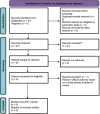A Remedy for Crime? A Systematic Review on the Effects of Pharmacological ADHD Treatment on Criminal Recidivism and Rehabilitation in Inmates With ADHD
- PMID: 39508643
- PMCID: PMC11542295
- DOI: 10.1002/brb3.70120
A Remedy for Crime? A Systematic Review on the Effects of Pharmacological ADHD Treatment on Criminal Recidivism and Rehabilitation in Inmates With ADHD
Abstract
Introduction: There is a high prevalence of attention-deficit/hyperactivity disorder (ADHD) in prison populations compared to the general population, and ADHD has also been shown to be associated with criminality and antisocial behavior. This systematic review examines the effect of pharmacological ADHD treatment on criminal recidivism, ADHD symptoms, and rehabilitation in inmates with ADHD.
Methods: Adhering to PRISMA 2020 and AMSTAR guidelines, we conducted a structured search on September 6, 2023 using PubMed. We focused on original research published in peer-reviewed scientific journals, following the IMRaD format, written in English, containing the established search terms, based on participants who met the criteria for ADHD diagnosis (any edition of DSM), and who were incarcerated at the start of pharmacological treatment for ADHD. The primary outcome was criminal recidivism, the secondary outcomes were ADHD symptoms, and rehabilitation-related factors such as global function, norm-breaking/antisocial behavior, adaptation to society/institutional behavior, cognitive function, and well-being.
Results: Five studies, based on three patient cohorts, were included in this systematic review. Surprisingly, only one study investigated criminal recidivism. That study indicated that self-reported criminal recidivism was lower than expected among inmates who had received pharmacological ADHD treatment. The five studies showed varying results in the effectiveness of pharmacological ADHD treatment on ADHD symptoms and other rehabilitation-related factors. The included studies also varied regarding participant characteristics, study design, dosage, adherence to treatment, treatment regimes, and measured outcomes. All studies reported using osmotic-release oral system (OROS) methylphenidate as their drug of choice.
Conclusion: We conclude that there is limited empirical evidence to support the efficacy of pharmacological ADHD treatment on criminal recidivism in inmates diagnosed with ADHD. Still, evidence suggests that these treatments can reduce ADHD symptoms and enhance rehabilitation outcomes, which may, in turn, lower the rate of reoffending. We point to the need for more targeted research in this area.
Keywords: ADHD; criminal recidivism; methylphenidate.
© 2024 The Author(s). Brain and Behavior published by Wiley Periodicals LLC.
Conflict of interest statement
The authors declare no conflicts of interest.
Figures

References
-
- American Psychiatric Association . 2013. Diagnostic and Statistical Manual of Mental Disorders (5th ed.). Washington, DC: American Psychiatric Publishing. 10.1176/appi.books.9780890425596. - DOI
-
- Asherson, P. , Johansson L., Holland R., et al. 2023. “Randomised Controlled Trial of the Short‐Term Effects of Osmotic‐Release Oral System Methylphenidate on Symptoms and Behavioural Outcomes in Young Male Prisoners With Attention Deficit Hyperactivity Disorder: CIAO‐II Study.” British Journal of Psychiatry 222, no. 1: 7–17. 10.1192/bjp.2022.77. - DOI - PMC - PubMed
Publication types
MeSH terms
Substances
LinkOut - more resources
Full Text Sources
Medical
Miscellaneous

